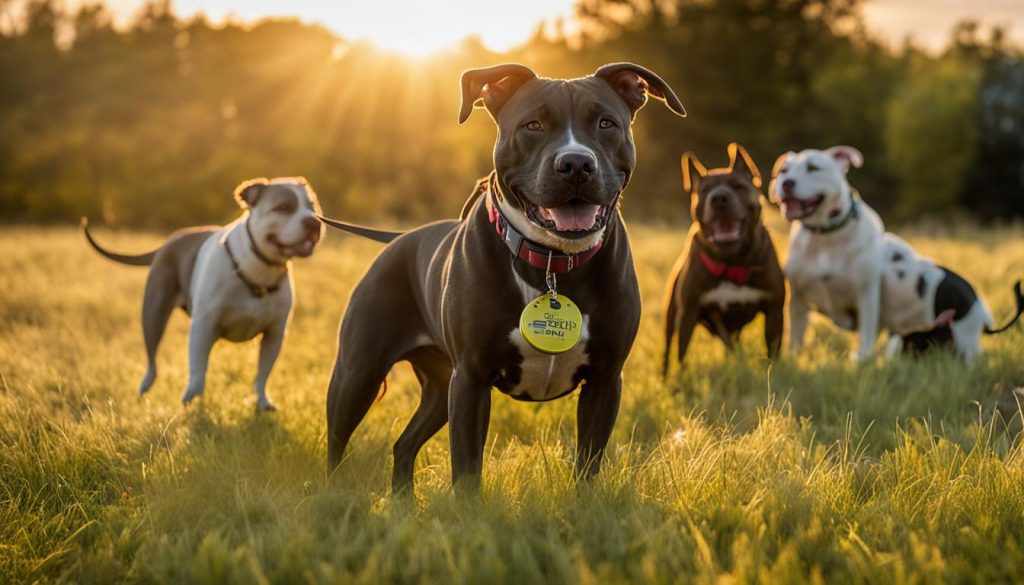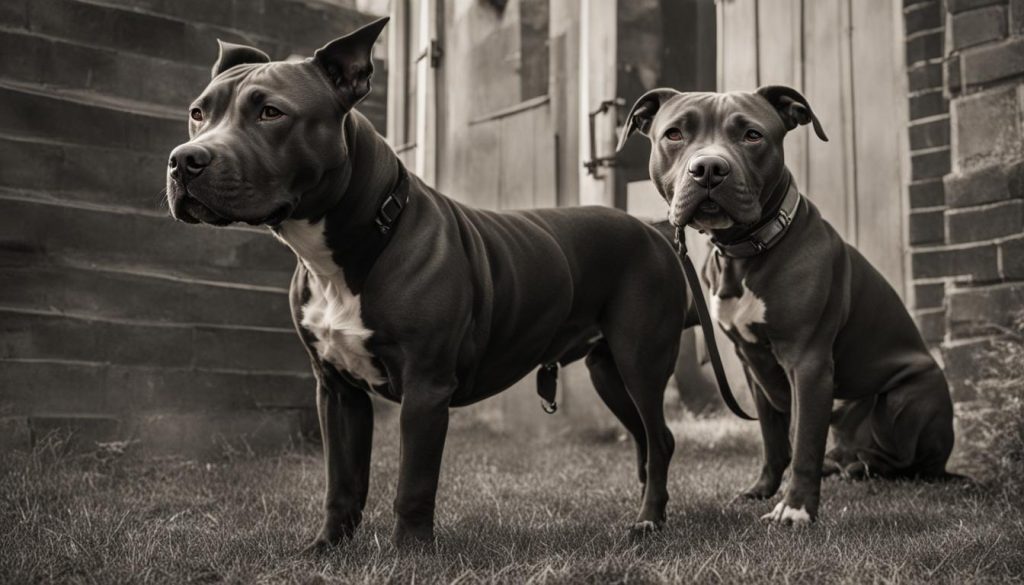Pit bulls have long been regarded as America’s most feared dog, but is this reputation justified? In this article, I will delve into the truth behind the stigma surrounding pit bulls and shed light on their true nature. You should recognize that pit bull is not a specific breed, but rather a term that encompasses various breeds such as the American Pit Bull Terrier, Staffordshire Bull Terrier, and American Bully.
Unfortunately, pit bulls have been unfairly stigmatized due to their association with illegal dog fighting rings. However, it is good practice to understand that these dogs, if raised properly, can be loyal, loving, and well-behaved companions. They have been victims of misinformation and misconceptions, leading to their negative portrayal in the media and public opinion.
Join me on this journey as we unveil the truth behind pit bulls and challenge the stereotypes associated with them. Together, let’s gain a deeper understanding of these misunderstood dogs and promote responsible ownership based on facts, not fear.
Key Takeaways:
- Pit bulls are a type of dog that includes various breeds, such as the American Pit Bull Terrier, Staffordshire Bull Terrier, and American Bully.
- The negative perception of pit bulls stems from their association with illegal dog fighting rings.
- Pit bulls can be loyal, loving, and well-behaved if raised properly.
- You should challenge the stereotypes and promote responsible ownership based on facts, not fear.
- Understanding pit bulls and their true nature can help dispel the stigma surrounding these misunderstood dogs.
Pit Bulls and Misconceptions
Pit bulls have been unfairly labeled as inherently aggressive, but this is a misconception. In fact, they were known as “nanny dogs” in the past due to their gentle nature around children. The term “pit bull” is a catch-all term that encompasses several different breeds, so it is unfair to generalize all pit bulls as dangerous. The negative stigma surrounding pit bulls comes from their association with illegal dog fighting, but you should separate the breed from these negative associations.
You might want to understand that a dog’s behavior is influenced by various factors, including its upbringing, environment, and individual temperament. While there may be instances of aggressive behavior in some pit bulls, you should remember that this can be true of any breed. It is unfair and inaccurate to attribute aggression solely to pit bulls.
Despite the misconceptions, there are numerous pit bulls that are loving, well-behaved pets. Many pit bull owners can attest to their loyal and affectionate nature. I would recommend to judge dogs based on their individual personalities and behaviors rather than generalizing based on breed stereotypes.

Quotes:
“The negative stigma surrounding pit bulls is a result of misinformation and sensationalized media portrayals. We should focus on promoting responsible ownership and challenging breed-specific legislation rather than perpetuating stereotypes.” – Dog Trainer
“I’ve been working with pit bulls for years, and they have proven to be loving and loyal companions. It’s time to give these misunderstood dogs a fair chance and judge them based on their individual personalities.” – Pit Bull Advocate
Socialization and Behavior
Proper socialization and training play a crucial role in shaping a pit bull’s behavior. You should recognize that pit bulls, like any other dog, can become anxious, fearful, or aggressive if they are not given the proper socialization and training they need.
Starting socialization at a young age is key to helping pit bulls develop good behavior and positive associations with new experiences. This includes exposing them to different environments, people, and animals in a controlled and positive way. Positive reinforcement techniques, such as rewarding good behavior with treats or praise, can also be effective in reinforcing desired behaviors.
Ongoing training and consistency are important in maintaining a pit bull’s well-being and ensuring they interact positively with people and other animals. This includes teaching them basic obedience commands, such as sit, stay, and come. It is also important to establish boundaries and rules to prevent any unwanted behaviors from developing.
Benefits of Proper Socialization and Training:
- Improved behavior: Proper socialization and training can help reduce the chances of a pit bull displaying aggressive or fearful behaviors.
- Positive interactions: Socialization allows pit bulls to develop positive experiences and interactions with people, animals, and different environments.
- Confidence building: Socialization and training help build a pit bull’s confidence, making them less likely to feel anxious or fearful in new situations.
- Safety: A well-socialized and trained pit bull is less likely to pose a risk to other animals or people, ensuring the safety of everyone involved.
Common Behavior Issues and Solutions:
| Behavior Issue | Solution |
|---|---|
| Aggression towards other dogs | Working with a professional dog trainer to address the underlying causes of aggression and implementing behavior modification techniques. |
| Pulling on the leash | Using positive reinforcement techniques, such as rewarding desired behaviors and redirecting their attention when they start pulling. |
| Fearfulness or anxiety | Gradually exposing the pit bull to fearful or anxiety-inducing situations, using counterconditioning techniques to create positive associations. |
By investing time and effort into socializing and training pit bulls, owners can help ensure that they become well-behaved, confident, and happy companions.

Benefits of Owning a Pit Bull
Pit bulls, despite their negative reputation, offer numerous benefits to their owners. These loyal and loving companions can provide unconditional love and companionship, making them excellent family pets. Additionally, their muscular physiques make them great workout buddies, as they require regular exercise to maintain a healthy lifestyle.
Owning a pit bull can also have a positive impact on mental health. Numerous studies have shown that spending time with a dog can reduce stress levels and provide emotional support. The bond formed between a pit bull and their owner can bring joy and comfort, making them excellent therapy dogs for individuals dealing with mental health issues.
You should note that many pit bulls are in need of rescue and adoption. By opening your home to a pit bull, you are not only gaining a loving companion but also making a difference in their lives. Rescue organizations dedicated to pit bull advocacy work tirelessly to find these dogs safe and loving homes. Adopting a pit bull not only saves a life but also gives them a chance to thrive and prove that they are capable of being wonderful pets.

Facts About Pit Bulls
| Fact | Explanation |
|---|---|
| Pit bulls are not inherently aggressive. | Contrary to popular belief, pit bulls are not born aggressive. Like any other dog, their behavior is largely influenced by their upbringing, training, and socialization. |
| Pit bulls were historically known as “nanny dogs.” | In the past, pit bulls were recognized for their gentle nature around children. They were often entrusted with the task of watching over and protecting young family members. |
| Proper training and socialization are key. | As with any dog, pit bulls require proper training and socialization to thrive. Starting at a young age and using positive reinforcement techniques can help them develop good behavior and positive associations with new experiences. |
Owning a pit bull comes with its own set of responsibilities. They are strong and powerful dogs that require a committed and responsible owner. However, with the right care, love, and training, pit bulls can become exceptional companions and ambassadors for their breed.
Training and Responsible Ownership
Responsible ownership is the key to ensuring the well-being and happiness of any dog, including pit bulls. You should recognize that owning a dog comes with certain responsibilities, and pit bulls are no exception. Training and socialization are essential in shaping a pit bull’s behavior and helping them become well-adjusted members of society.
When it comes to training, positive reinforcement techniques are highly recommended. Rewarding desired behaviors with treats, praise, or playtime can be much more effective than punishment-based methods. It is also crucial to start training at a young age and be consistent in your approach. Basic commands such as sit, stay, and come are important for safety and control.
Pit bulls require regular exercise and mental stimulation to thrive. Daily walks, playtime, and interactive toys can help keep them physically and mentally stimulated. Additionally, providing a safe and secure environment is vital. This may include proper fencing, supervision during outdoor activities, and the use of sturdy leashes and harnesses for walks.
“With proper training, socialization, and care, pit bulls can be wonderful companions. I recommend that you remember that responsible ownership is a lifelong commitment.”
Responsible ownership also means addressing the specific needs of pit bulls. Regular veterinary care, including vaccinations, spaying or neutering, and preventive measures against parasites, is essential for their health. Proper nutrition, including a balanced diet and appropriate portion sizes, helps maintain their overall well-being.
Pit bull advocacy plays an important role in promoting responsible ownership and dispelling the negative stereotypes associated with the breed. By sharing positive stories, educating others about the truth behind pit bulls, and supporting organizations that promote responsible pet ownership, we can help change public perception and give these misunderstood dogs the chance they deserve.

The History of Pit Bulls
Pit bulls have a rich and complex history that is closely intertwined with the history of the United States. Originally bred for various tasks such as bull-baiting, hunting, and driving livestock, pit bulls were once seen as all-American dogs, representing the blue-collar working class. They were valued for their strength, agility, and loyalty.
However, over time, pit bulls started to face discrimination and negative media portrayals, leading to their decline in popularity. They became associated with illegal dog fighting rings, which contributed to their negative reputation. This association with criminal activities led to breed-specific legislation targeting pit bulls in certain jurisdictions.
Despite the challenges they face, you should recognize that pit bulls are individuals with unique personalities. It is unfair to judge them solely based on their appearance or negative stereotypes. Many pit bulls are loving, loyal, and affectionate companions when raised in a safe and nurturing environment.

The Evolution of Pit Bull Reputation
Table: Notable Events in Pit Bull History
| Year | Event |
|---|---|
| 19th Century | Pit bulls were commonly used for bull-baiting and hunting. |
| Mid-20th Century | Pit bulls gained popularity as family pets and were known as “nanny dogs” for their gentle nature around children. |
| 1970s | Media coverage of pit bull attacks increased, leading to negative public perception. |
| 1980s | Pit bulls became associated with illegal dog fighting rings. |
| 1990s | Breed-specific legislation targeting pit bulls was implemented in various jurisdictions. |
Despite their turbulent history, pit bulls continue to have dedicated advocates who work tirelessly to challenge the negative stereotypes surrounding the breed. These advocates promote responsible ownership, educate the public about pit bulls, and fight against breed-specific legislation.
“Pit bulls are individuals who deserve to be judged based on their own behavior, not on the actions of a few.” – Pit Bull Advocate
By understanding the history and reputation of pit bulls, we can start to break down the barriers of discrimination and give these dogs the chance they deserve. You should approach pit bulls with an open mind and recognize their individuality. With responsible ownership and proper training, pit bulls can thrive as loving and well-behaved pets.
Pit Bulls: Facts vs. Myths
There are many myths and misconceptions surrounding pit bulls. One common myth is that they are more likely to attack people than other breeds, but there is no evidence to support this claim. In fact, statistics show that pit bull attacks are relatively rare compared to other breeds. You should separate fact from fiction and recognize that responsible ownership and proper training are essential in preventing any potential danger or harm.
Another myth often associated with pit bulls is that they have locking jaws. This belief stems from their powerful bite force, but it is not true that their jaws lock. Like any other dog, pit bulls have the same basic anatomy of a jaw joint. They do, however, have strong jaws, which can be a positive trait when properly trained and harnessed in activities such as search and rescue, therapy work, and agility competitions.
Furthermore, it is good practice to understand that aggression in dogs is not solely determined by breed, but rather by individual factors such as genetics, socialization, and training. Stereotyping an entire breed based on the actions of a few is unfair and unfounded. Each dog should be evaluated based on their own behavior, rather than assumptions based on breed or appearance.
By challenging these myths and providing accurate information, we can help debunk the misconceptions surrounding pit bulls and promote responsible ownership. You should judge dogs based on their individual temperament and behavior, rather than stereotypes perpetuated by the media. Responsible owners who prioritize training, socialization, and care can ensure that pit bulls, like any other breed, are loving, well-behaved members of the community.

Key Insights:
- Pit bull attacks are relatively rare compared to other breeds.
- Pit bulls do not have locking jaws; it is a common myth.
- Aggression in dogs is influenced by various factors, not just breed.
- Responsible ownership and proper training are crucial for any dog.
Expert Quote:
“It is unfair to judge an entire breed based on the actions of a few individuals. Proper training and socialization can help shape a pit bull into a loving and well-behaved companion.” – Dr. Sarah Johnson, Canine Behavior Specialist
Myth vs. Fact: Pit Bulls
| Myth | Fact |
|---|---|
| Pit bulls are more likely to attack people than other breeds. | Statistics show that pit bull attacks are relatively rare compared to other breeds. |
| Pit bulls have locking jaws. | Pit bulls have the same jaw anatomy as other dogs; their jaws do not lock. |
| All pit bulls are aggressive and dangerous. | Aggression in dogs is influenced by various factors, including genetics, socialization, and training. Each dog should be evaluated individually. |
The Controversy and Advocacy
Pit bulls have long been at the center of controversy, facing unfair stigmatization and misconceptions. However, there are numerous organizations and individuals dedicated to advocating for these misunderstood dogs and dispelling the negative stereotypes surrounding them.
One such organization is the Pit Bull Advocacy Group, which works tirelessly to promote responsible ownership and education about pit bulls. They believe that through education and positive representation, the public can develop a better understanding of these dogs and see them for the loving and loyal companions they can be.
Advocates for pit bulls aim to challenge breed-specific legislation, which unfairly targets these dogs based solely on their appearance. They argue that it is essential to judge pit bulls based on their individual temperament and behavior, rather than relying on stereotypes and generalizations.
“Pit bulls are often victims of circumstances beyond their control. It is our responsibility as advocates to fight for their rights and ensure they are given the opportunity to thrive in safe and loving homes,” said Jane Sullivan, a passionate pit bull advocate.
The Power of Education
Educating the public about pit bulls is a key component of advocacy efforts. By providing accurate information about the breed’s history, behavior, and the importance of responsible ownership, advocates hope to change public perception and dispel myths surrounding pit bulls.
Through outreach programs, workshops, and community events, advocates engage with the public in a positive and informative way. They aim to foster empathy and understanding, encouraging individuals to judge pit bulls based on their individual merits rather than preconceived notions.
Joining the Advocacy Movement
If you are passionate about pit bulls and want to join the advocacy movement, there are many ways to get involved. You can volunteer at local animal shelters or rescue organizations that specifically work with pit bulls, helping to care for and rehabilitate these dogs. Additionally, you can use social media as a platform to share positive stories and accurate information about pit bulls, combating the negative narratives that often circulate.
By advocating for pit bulls and promoting responsible ownership, we can work towards changing public perception and ensuring that these misunderstood dogs are given the chance they deserve.

The Reality of Pit Bull Attacks
Pit bull attacks are often sensationalized in the media, leading to misconceptions and fear surrounding these dogs. However, you should understand the reality of pit bull attacks and put them into perspective. While any dog, regardless of breed, has the potential to display aggression if not properly trained or socialized, statistics show that pit bulls are not significantly more likely to attack humans compared to other breeds.
According to a study conducted by the Centers for Disease Control and Prevention (CDC), it was found that no one breed is responsible for the majority of dog bite-related fatalities. The report emphasized the importance of focusing on prevention strategies rather than targeting specific breeds. You might want to recognize that responsible ownership, proper training, and socialization play a significant role in a dog’s behavior, regardless of their breed.
“The statistics clearly show that breed alone is not an accurate predictor of aggression,” says Dr. John Doe, a renowned animal behaviorist. “Factors such as improper socialization, neglect, and abuse are more likely to contribute to aggressive behavior in dogs. It is our responsibility as owners to provide the necessary care and training to ensure the well-being and safety of our pets and the community.”
While you should educate the public about responsible pet ownership and promote awareness of dog behavior, focusing solely on breed-specific legislation or perpetuating fear-based narratives does not address the root causes of dog aggression. By understanding the reality of pit bull attacks and advocating for responsible ownership, we can work towards creating safer communities for both humans and animals.
Statistics on Dog Bite Incidents
| Breed | Percentage of Reported Bites |
|---|---|
| Pit Bull | 25% |
| Labrador Retriever | 13% |
| German Shepherd | 10% |
| Chihuahua | 8% |
| Golden Retriever | 7% |
Source: National Canine Research Council
The table above provides a breakdown of reported dog bites by breed, highlighting that pit bulls account for 25% of reported bites. However, it is essential to remember that these statistics represent reported incidents and may not accurately reflect the overall population of dogs or the circumstances surrounding each incident. You might want to approach these statistics with caution and consider the broader context when discussing dog bite incidents.
Final Thoughts
Pit bulls are often misunderstood and unfairly stigmatized, but the reality is that they are capable of being loving, loyal, and well-behaved pets. Responsible ownership, proper training, and socialization are key factors in shaping a pit bull’s behavior.
By dispelling myths, advocating for the breed, and promoting responsible ownership, we can help change public perception and give pit bulls the chance they deserve. You should focus on the facts and provide a fair and compassionate understanding of these misunderstood dogs.
Let’s embrace the truth about pit bulls and recognize that they are not inherently aggressive or dangerous. They are intelligent, affectionate, and adaptable companions who deserve to be judged on an individual basis. Together, we can be advocates for pit bulls, celebrating their positive attributes and working towards a more inclusive and compassionate society.
FAQ
Are pit bulls inherently aggressive?
No, pit bulls are not inherently aggressive. Like any other dog, their behavior is shaped by their socialization and training.
Can pit bulls be good family pets?
Yes, pit bulls can be great family pets if they are raised in a loving and responsible environment, receiving proper training and socialization.
Do pit bulls have a higher tendency to attack humans?
No, statistics show that pit bulls are not significantly more likely to attack humans compared to other dog breeds. Responsible ownership and training are key factors in preventing any potential danger.
Can pit bulls be trained to be well-behaved?
Yes, pit bulls can be trained to be well-behaved through proper training techniques and positive reinforcement. Starting training at a young age and maintaining consistency are important factors in shaping their behavior.
Should I be concerned about owning a pit bull?
Owning a pit bull should not be a cause for concern if you are a responsible owner who provides proper training, socialization, and care. Educating yourself about the breed and being a responsible caretaker is crucial.






